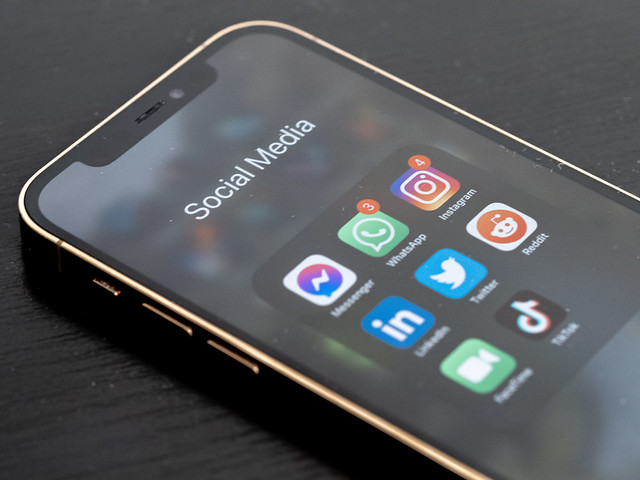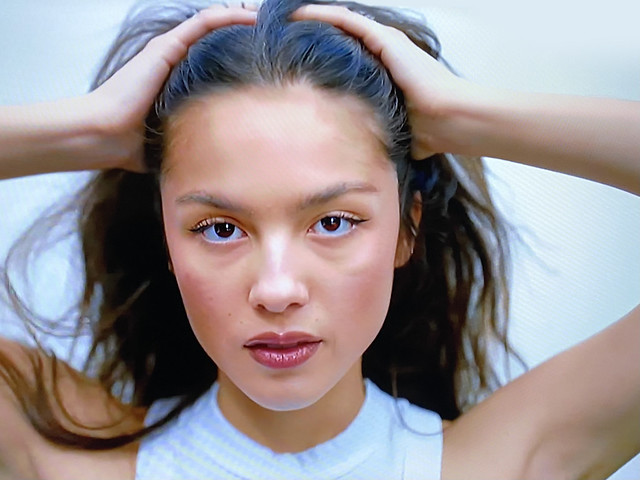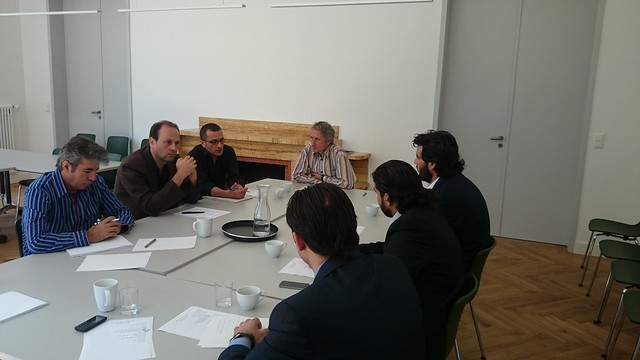This hyper-textual essay will discuss the political and economic issues that has an impact on the institutions, public and commercial interests regarding the copyright feud and accusations between smaller artists. The easy will involve concepts including moderation and regulations and public and commercial interests of social media platforms. The article will unravel two major case studies, Olivia Rodrigo and Taylor Swift, and a Korean girls’ group, Fifty Fifty and their associated music artists.
Definition & Role of Platforms
A platform functions via data-based algorithms and interfaces that primarily “host, organise, and circulate users’ shared content or social interactions” (Dijck et al., 2018, p.19; Gillespie, 2018, p.9). However, these platforms, such as TikTok, have adverse sides, which raise the question of trust and transparency in moderation and content regulations (Dijck et al., 2018; Gillespie, 2018). Whether moderating or regulating content, these platforms do not shed light on social, political and legal processes as they are hidden and enforced with algorithms despite emphasising that the regulations are in ‘transparency’ on the platform (Dijck et al., 2018; Gillespie, 2018). This notion compromises allowing trust between the platform and the external actors (I.e., Public, governments and other involved institutions) (Dijck et al., 2018; Gillespie, 2018).
The Music Industry on TikTok
Consequently, whether they are small artists or big artists, artists from around the world can broaden and connect their audiences at a greater level, and some artists become popular. However, there are both adverse side effects on artists who became famous on social media platforms such as TikTok.
According to an American study, three-quarters of TikTok users conveyed that TikTok has allowed users to discover new artists (David, 2021). Additionally, more than half reveal that TikTok increases the probability of seeking out a song if they heard it on TikTok (David, 2021).
Definition of Copyright
The term’ copyright’ is used in various forms of intellectual properties of all industries (U.S. Copyright Office, 2023). The concept of ‘copyright’ should not differ in the music industry and the TikTok Community (TikTok, 2021).
Flew, Martin and Suzor (2019) contribute an understanding that there were concerns about the platform’s involvement. The involvement of platforms in criticism situations, such as power abuse, copyright infringement and hate speech, to name a few, has been referred to as a ‘techlash’ (Flew, Martin and Suzor, 2019). Referring to being a global widespread “techlash” has allowed the legal, social and political to contest whether existent media policy and regulation can grapple with such problems (Flew, Martin and Suzor, 2019)
In addition, Suzor (2019, p.60) elaborates that copyright owners have control that extends to collaborating with Internet and social media platform companies to protect from copyright infringement proactively, such as by removing content. Suzor (2019) supports that social network platforms, such as TikTok, are legally immune to legal for oversights the involvement in removing content.
Nonetheless, this is not the case, and situations between small and big artists create controversy. As we unravel the examples of alleged copyright issues between smaller and bigger artists in TikTok, the essay will underpin how the role of copyright has led to legal, social, economic and political issues in the article.
Who is Olivia Rodrigo and what is Olivia Rodrigo v Taylor Swift Copyright Accusation Scandal?
Rodrigo was a small artist in the music industry who gained fame on TikTok since ‘drivers license’ was created in 2021. However, since her album, Sour, was published, the public has pointed out similarities with Taylor Swift’s “Cruel Summer” and Rodrigo’s “Déjà vu”, causing significant accusations of copyright infringement.
A breakdown summary of alleged scandal between Rodrigo and Taylor Swift was explained in a TikTok video created by the user, @michelletok (michelle, 2023).
In the video, user, @michelletok, elaborates that Rodrigo was a fan of Taylor Swift which have led her to writing and creating songs (michelle, 2023). The user also commented that ‘the big artists gets “funny about songs” when they ‘gain fame’ and “people (Taylor Swift) wants credit” after it gained fame’ (michelle, 2023).
The Rise of K-Pop group, Fifty Fifty Copyright Scandal

Fifty Fifty is a girls K-Pop group that was formed and debuted in 2022 (Ha, 2023).Their popular song, Cupid featuring Sabrina Carpenter, was made into fame when it was released early this year, 2023 (Ha, 2023). But, however, on the same year, 2023, the group was allegedly accused of plagiarism for a Turkish song, “Sen Aşkımızdan by Evrencan Gündüz” (Ha, 2023). This example, compared to the Rodrigo and Taylor Swift case, demonstrates a precise alignment of similarities between these case studies in copyright infringement.
What are TikTok’s community guidelines on copyright? What did TikTok do for the accusation?
Rather than moderating and regulating the content to disperse the public interest, TikTok has used it indirectly against its community guidelines (TikTok, 2023; Zeng & Maye, 2022; Suzor, 2019). According to TikTok, the policies regarding copyright infringement are not tolerated, as quoted below in the excerpt (TikTok, 2023).
“Videos that mislead others or that violate the trademark or copyrights or any intellectual property right of someone else are not allowed on the platform. We strive to be transparent about our policies. For this reason, when a video is removed for violating our policies, we’ll let the video’s creator know which Community Guidelines were violated in leading to the removal and provide the video creator with the ability to appeal the decision. “
Excerpt from TikTok Community Guidelines
In the case between Rodrigo and Taylor Swift, the legal issues of copyright infringement have perked the public’s interest. Hence, TikTok has made the copyright infringement into a public and commercial interest. However, no direct information or announcement regarding TikTok’s full involvement exists. Similarly, the copyright infringement issue between Fifty-Fifty and the Turkish artist Evrencan Gündüz played a major “downplay” on the platform regulation (Dijck et al., 2018; Gillespie, 2018).
Furthermore, in alignment with Flew, Martin and Suzor (2019), the impact of the case studies of both Rodrigo and Taylor Swift, and Fifty-Fifty and the Turkish artist, have made public and legal institutions criticise the lack of ability to reduce the detrimental impacts on hate speech and other negative influences.
In dealing with detrimental harm between the artists, institutions, and the public, moderators and regulators of social media platforms have become relevant to the debate on the visibility of the impacts that content moderation has on the social and political aspects as Gillespie (2018b) explains that moderation in platforms such as TikTok and Instagram shapes information exchange and user activity. Furthermore, Gillespie (2018b) elaborates that the process of moderation is via decisions and filtration of appropriation in accordance with “policies”, “legal requirements” and “cultural norms” (Gillespie, 2018b; Suzor, 2019).
Nonetheless, between the artists, their representative companies and platforms, issues such as copyright infringement are moderated and regulated through negotiating an agreement (Zeng & Kayem, 2022). The agreement between the institutions and the public is made to re-contribute (Zeng & Kayem, 2022). The method of negotiation to regulate between platforms’ authority and users’ agency allows for resistance and contestation between commercial interests and regulatory obligations (Cotter, 2019, 2021 cited in Suzor, 2019).
This example of moderation is addressed through financial and legal interests and actions as it is remarkably discussed through various news-sharing agency websites such as BuzzNewsFeed.com, Sydney Morning Herald, and Cosmopolitan. The legal and financial means of regulating and moderating the copyright infringement issue in the case study is through “paying millions of dollars in royalties” and acknowledging the copyright given to Taylor Swift and “withholding royalties until issues resolved” (Henry, 2021; Teodoro, 2023).
Conclusions
In conclusion, the relationship between institutions, platforms and the public plays a vital role in regulating and moderating content. However, regulating and moderating content on platforms such as TikTok, can have major adverse effects. One of the concerns that the public debates often is the way platform moderates with copyright issues. The essay employs the case studies of ‘Olivia Rodrigo and Taylor Swift’ and ‘Fifty Fifty and the Turkish artist’. With the similarities between these case studies, the essay cross-examines the intentions of platforms that impacted social, political, and legal aspects of copyright between small and big artists.
References
David, L. (2021, Sep 15). For better or worse, TikTok is driving the music industry.University Wire http://ezproxy.library.usyd.edu.au/login?url=https://www.proquest.com/wire-feeds/better-worse-tiktok-is-driving-music-industry/docview/2572720968/se-2
Dijck José van Poell T. & Waal M. de. (2018). The Platform Society as a Contested Concept. In Dijck, The platform society (pp. 5–32). Oxford University Press. https://doi.org/10.1093/oso/9780190889760.001.0001
Evrencan Gündüz. (2018, September 17). Evrencan Gündüz, Melisa Karakurt & Ece Cansu – Sen Aşkımızdan [Video]. YouTube. https://www.youtube.com/watch?v=ZyVzm8AOdY4
FIFTY FIFTY Official. (2023, February 24). FIFTY FIFTY (피프티피프티) – ‘Cupid’ Official MV [Video]. YouTube. https://www.youtube.com/watch?v=Qc7_zRjH808
Flew, T., Martin, F., & Suzor, N. (2019). Internet regulation as media policy: Rethinking the question of digital communication platform governance. Journal of Digital Media & Policy, 10(1), 33–50. https://doi-org.ezproxy.library.sydney.edu.au/10.1386/jdmp.10.1.33_1
Gillespie, T. (2018a). CHAPTER 1. All Platforms Moderate. In Custodians of the Internet: Platforms, Content Moderation, and the Hidden Decisions That Shape Social Media (pp. 1-23). New Haven: Yale University Press. https://doi.org/10.12987/9780300235029-001
Gillespie, T (2018b). Governance by and through Platforms. In Burgess & ProQuest (Firm) (Eds.), The SAGE handbook of social media (pp. 254–278). SAGE Publications. https://ebookcentral-proquest-com.ezproxy.library.sydney.edu.au/lib/usyd/detail.action?docID=5151795#
Henry, B. (2021, September 2). Olivia Rodrigo has reportedly given up millions of dollars in royalties to Taylor Swift and Hayley Williams after being accused of copying their songs. BuzzFeed News. https://www.buzzfeednews.com/article/benhenry/olivia-rodrigo-paramore-good-4-u-taylor-swift-deja-vu
michelle. (2022, May) breaking down the alleged fued between #taylorswift and #oliviarodrigo …what’s the tea girls?! #swifttok [Video]. YouTube. https://www.tiktok.com/@michelletok/video/7235808300867046698
Moran, R. (2023, September 12). Rodrigo v Swift: It must be exhausting always rooting for the popstar feud. The Sydney Morning Herald. https://www.smh.com.au/culture/music/rodrigo-v-swift-it-must-be-exhausting-always-rooting-for-the-popstar-feud-20230912-p5e3wd.html
Olson, S. (2023, September 9). Are Olivia Rodrigo’s “The grudge” lyrics about Taylor Swift? – cosmopolitan. Cosmopolitan. https://www.cosmopolitan.com/entertainment/music/a45049276/olivia-rodrigo-the-grudge-lyrics-meaning/
Suzor, N. (2019). Lawless: The Secret Rules That Govern our Digital Lives. Cambridge: Cambridge University Press. doi:10.1017/9781108666428
Teodoro, F. (2023, July 18). KOMCA to withhold royalty payments for fifty fifty’s “Cupid” until copyright issue is settled. International Business Times. https://www.ibtimes.com/komca-withhold-royalty-payments-fifty-fiftys-cupid-until-copyright-issue-settled-3705528
TikTok. (2021, October 11). Community guidelines. TikTok Creator Portal. https://www.tiktok.com/creators/creator-portal/en-us/community-guidelines-and-safety/community-guidelines/
U.S. Copyright Office. (2023). What is copyright?. What is Copyright? | U.S. Copyright Office. https://www.copyright.gov/what-is-copyright/
Zeng, J., & Kaye, D. B. V. (2022). From content moderation to visibility moderation: A case study of platform governance on TikTok. Policy & Internet, 14, 79–95. https://doi.org/10.1002/poi3.287










Be the first to comment on "The rise of smaller artists on TikTok created controversies over copyright between small and big artists"